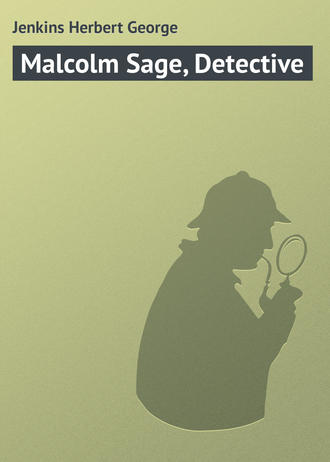 полная версия
полная версияMalcolm Sage, Detective
"To bring the nephew to reason," suggested Malcolm Sage.
"To give advice ostensibly; but in reality to talk things over," wasthe reply.
"You advised?" When keenly interested, Malcolm Sage's questions werelike pistol-shots.
"That Challoner should wait and see the girl."
"Did he?"
Malcolm Sage was intent upon outlining his hand with the point ofthe paper-knife upon the blotting pad.
Again Sir James hesitated, only for a fraction of a second, however.
"Yes; but unfortunately with the object of endeavouring to buy heroff. Yesterday afternoon Dane brought her over. Challoner saw heralone. She didn't stay more than a quarter of an hour. Then she andDane left the house together, he to see her to the station. An hourlater he returned. I was in the hall at the time. He was in a veryexcited state. He pushed past me, burst into the library, bangingthe door behind him.
"That evening at dinner Challoner told me there had been a veryunpleasant scene. He had warned the boy that unless he apologisedto-day he would telephone to London for his lawyer, and make a freshwill entirely disinheriting him. Soon after the interview Dane wentout of the house, and apparently did not return until late – as amatter of fact, after I had gone to bed. I was feeling tired andsaid 'good night' to Challoner about half-past ten in the library."
For some time Malcolm Sage gazed upon the outline he had completed,as if in it lay the solution of the mystery.
"It's a pity you let the butler unlock the door," he remarkedregretfully.
Sir James looked across at his late chief-of-staff keenly. Hedetected something of reproach in his tone.
"Did you happen to notice if the electric light was on when youentered the library?"
"No," said Sir James, after a slight pause; "it was not."
Malcolm Sage reached across to the private telephone and gave the"three on the buzzer" that always galvanised Miss Gladys Norman intoinstant vitality.
"Miss Norman," said Sage as she entered, "can you lend me the smallmirror I have seen you use occasionally?"
"Yes, Mr. Sage," and she disappeared, returning a moment later withthe mirror from her handbag. She was accustomed to Malcolm Sage'sstrange requests.
"Feeling better?" he enquired as she turned to go.
"I'm all right now," she smiled, "and please don't send me home, Mr.
Sage," she added, and she went out before he had time to reply.
A quarter of an hour later the two men entered Sir James's car, whilst Thompson and Dawkins, the official photographer to the Bureau, followed in that driven by Tims. Malcolm Sage would cheerfully havesacrificed anybody and anything to serve his late chief.
"And how am I to keep the shine off my nose without a looking-glass,Johnny?" asked Miss Norman of William Johnson, as she turned toresume her work.
"He won't mind if it shines," said the youth seriously; and MissNorman gave him a look, which only his years prevented him from interpreting.
II
As the car drew up, the hall-door of "The Cedars" was thrown open bythe butler, a fair-haired clean-shaven man of about forty-five, withgrave, impassive face, and eyes that gave the impression of allowinglittle to escape them.
As he descended the flight of stone-steps to open the door of thecar, a young man appeared behind him. A moment later Sir James wasintroducing him to Malcolm Sage as "Mr. Richard Dane."
Dark, with smoothly-brushed hair and a toothbrush moustache, hemight easily have been passed over in a crowd without a secondglance. He was obviously and acutely nervous. His fingers movedjerkily, and there were twitchings at the corners of his mouth thathe seemed unable to control. It was not a good-tempered mouth. Heappeared unconscious of the presence of Malcolm Sage. His eyes werefixed upon the second car, which had just drawn up, and from whichThompson and Dawkins were removing the photographic paraphernalia.
Peters conducted Sir James and Malcolm Sage to the dining-room, where luncheon was laid.
"Shall I serve luncheon, Sir James?" he enquired, ignoring Dane, whowas clearly unequal to the strain of the duties of host.
Sir James looked across at Malcolm Sage, who shook his head.
"I'll see the library first," he said. "Sir James will show me.Fetch Dawkins," he said to Thompson, and he followed Sir Jamesthrough the house out on to the lawn.
As they entered the library by the French-windows, a tall, sandy manrose from the armchair in which he was seated. He was InspectorGorton of the Sussex County Constabulary. Malcolm Sage nodded alittle absently. His eyes were keenly taking in every detail of thefigure sprawling across the writing-table. The head rested on theleft cheek, and there was an ugly wound in the right temple fromwhich blood had dripped and congealed upon the table. In the righthand was clutched a small, automatic pistol. The arm was slightlycurved, the weapon pointing to the left.
Having concluded his examination of the wound, Malcolm Sage drew asilk-handkerchief from his pocket, shook out its folds and spread itcarefully over the blood-stained head of Mr. Challoner.
Sir James looked across at him, appreciation in his eyes. It was oneof those little human touches, of which he had discovered so many inMalcolm Sage, and the heads of government departments in Whitehallso few.
Malcolm Sage next proceeded to regard the body from every angle, even going down on his knees to see the position of the legs beneaththe table. He then walked round the room and examined everythingwith minute attention, particularly the key of the door, which SirJames had replaced in its position on the inside. The keyhole onboth sides of the door came in for careful scrutiny.
He tried the door of a small safe at the far-end of the room; it waslocked. He then examined the fastenings of the French-windows.
Finally he returned to the table, where, dropping on one knee on theleft-hand side of the body, he drew a penknife from his pocket, andproceeded with great care and deliberation to slit up the outer seamof the trousers so that the pocket lay exposed.
This in turn he cut open, taking care not to disturb the bunch ofkeys, which, attached to a chain, lay on the thigh, a little to theleft.
The others watched him with wide-eyed interest, the inspectorbreathing heavily.
Having assured himself that the keys would not slide off, Malcolm
Sage rose and turned to Dawkins:
"I want a plate from the right, the left, the front, and from behindand above. Also an exposure showing the position of the legs, andanother of the keys."
Dawkins inclined his head. He was a grey, bald-headed little man whohad only one thought in life, his profession. He seldom spoke, andwhen he did his lips seemed scarcely to part, the words slipping outas best they could.
Happy in the knowledge that his beloved camera was once more to beone of the principal witnesses in the detection of a crime, Dawkinsset himself to his task.
"When Dawkins has finished," said Malcolm Sage, turning to theinspector, who had been watching the proceedings with ill-disguisedimpatience, "you can remove the body; but leave the pistol. Give Mr.Challoner's keys to Sir James. And now I think we might lunch," hesaid, turning to Sir James.
Malcolm Sage's attitude towards the official police was generallydetermined by their attitude towards him. In the Department Z days,he had been known at Scotland Yard as "Sage & Onions." What thephrase lacked in wit was compensated for by the feeling with whichit was frequently uttered. The police officers made no effort todissemble the contempt they felt for a department in which they sawa direct rebuke to themselves. Later, however, their attitudechanged, and Malcolm Sage was brought into close personal touch withmany of the best-known officers of the Criminal InvestigationDepartment.
He had never been known to speak disparagingly, or patronisingly, ofScotland Yard. On the other hand, he lost no opportunity ofemphasising the fact that it was the head-quarters of the mostefficient police force in the world. He did not always agree withits methods, which in many ways he regarded as out-of-date.
As Malcolm Sage left the room, the inspector shrugged his shoulders.
The whole thing was so obvious that, but for the presence of Sir
James Walton, he would have refused to delay the removal of the body.
The doctor had pronounced the wound self-inflicted, and even if he had not done so, the circumstantial evidence was conclusive.
Luncheon was eaten in silence, a constrained and uncomfortable meal.Malcolm Sage ate as he always ate when his mind was occupied, withentire indifference as to what was on the plate, from which his eyesnever lifted.
Sir James made several ineffectual efforts to draw Dane intoconversation; but at each remark the young man started violently, asif suddenly recalled to his surroundings. Finally Sir James desisted, and the meal concluded in abysmal silence.
Malcolm Sage then announced that he would examine the variousmembers of the household, and Dane and Peters left the room.
One by one the servants entered, were interrogated, and departed.Even the gardener and his wife, who lived at the lodge by themain-gates, were cross-questioned.
Mrs. Trennett, the housekeeper, was incoherent in her volubleanxiety to give information. The maids were almost too frightened tospeak, and from none was anything tangible extracted.
No one had any reason for being near the library late at night.
When Peters' turn came, he told his story with a clearness andeconomy of words that caused Malcolm Sage mentally to register himas a good witness. He was a superior kind of man, who had been inhis present position only some six months; but during that time hehad given every satisfaction, so much so that Mr. Challoner hadremarked to Sir James that he believed he had found a treasure.
According to Peters' account, at a quarter-past eleven on theprevious evening he had gone to the library, as was his custom, tosee if there were anything else that Mr. Challoner required beforehe locked up for the night. On being told there was nothing, he hadaccordingly seen to the fastenings of doors and windows and gone tobed.
"What was Mr. Challoner doing when you entered the room?" enquiredMalcolm Sage, intent upon a design he was drawing upon the surfaceof the salt.
"He was sitting at the table where I found him this morning."
"What was he actually doing?"
"I think he was checking his bankbook, sir."
"Did you notice anything strange about his manner?"
"No, sir."
"When you found that his bed had not been slept in were yousurprised?"
"Not greatly, sir," was the response. "Once before a similar thinghappened, and I heard from the other servants that on severaloccasions Mr. Challoner had spent the night in the library, havingfallen asleep there."
"When you told Mr. Dane that his uncle had not slept in his room, and that the library door was locked on the inside, what did hesay?"
"He said, 'Good Lord! Peters, something must have happened.'"
"Mr. Dane knew that on previous occasions his uncle had spent thenight in his study?" enquired Malcolm Sage, smoothing out the designupon which he had been engaged and beginning another.
"I think so, sir," was the response.
"The pistol was the one he used at target-practice?"
"Yes, sir."
"Where did he keep it?"
"In the third right-hand drawer of his table, sir."
"He was a good shot, I think you said?" Malcolm Sage turned to Sir
James.
"Magnificent," he said warmly. "I have often shot with him."
"Do you know of any reason why Mr. Challoner should commit suicide?"
Malcolm Sage enquired of Peters.
"None whatever, sir; he always seemed very happy."
"He had no domestic worries?"
Peters hesitated for a moment.
"He never mentioned any to me, sir."
"You have in mind certain events that occurred during the last fewdays, I take it?" said Malcolm Sage.
"That was in my mind, sir," was the response.
"You know of no way by which anyone could have got into the libraryand then out again, other than through the door or the window?"
Malcolm Sage had relinquished the salt-spoon and was nowmeditatively twirling a wineglass by its stem between his thumb andfirst finger.
"There is no other way, sir."
"Who has access to the library in the ordinary way? Tell me thenames of everybody who is likely to go in at any time."
"Outside Mr. Challoner and Mr. Dane, there is myself, Mrs. Trennett, the housekeeper, and Meston, the housemaid."
"No one else?"
"No one, sir, except, of course, the guests who might be staying inthe house."
"I shall want the finger-prints of all those you have named, including yours, Sir James." Malcolm Sage looked across at Sir James
Walton. "I can then identify those of any stranger that I may find."
Sir James nodded.
"It would be quite easy for Mr. Challoner to let anyone in throughthe French-windows?" enquired Malcolm Sage, turning once more toPeters.
"Quite, sir."
"What time did Mr. Dane return last evening?"
"I think about a quarter to eleven, sir. He went straight to hisroom."
"That will be all now. Tell Mr. Dane I should like to see him."
Peters noiselessly withdrew.
A few minutes later Dane entered the room. Malcolm Sage gave him akeen, appraising look, then dropped his eyes. Dane was still acutelynervous. His fingers moved jerkily and the corners of his mouthtwitched.
"Will you tell me what took place yesterday between you and youruncle?" said Malcolm Sage.
Dane looked about him nervously, as an animal might who has beentrapped and seeks some means of escape.
"We had a row," he began, then paused; "a terrible row," he added,as if to emphasise the nature of the quarrel.
"So I understand," said Malcolm Sage. "I know what it was about.Just tell me what actually took place. In as few words as possible, please."
"A week ago I told my uncle of my engagement, and he was very angrywhen he knew that my fiancée was – was —
"A secretary," suggested Malcolm Sage, without looking up.
"Yes. He ordered me to break off the engagement at once, no matterwhat it might cost."
"He referred to his pocket rather than to your feelings, I take it?"said Malcolm Sage.
"Yes." There was a world of bitterness in the tone in which the wordwas uttered. "I refused. Four days ago Sir James came and, I think, talked things over with my uncle, who said he would see Enid, thatis, my fiancée. She came yesterday afternoon. My uncle insisted onseeing her alone. She stayed only a few minutes."
His voice broke. He swallowed rapidly several times in succession, struggling to regain control of himself.
"You walked back to the station with her," remarked Malcolm Sage,"and she told you what had taken place. Your uncle had offered tobuy her off. You were furious. You said many wild and extravagantthings. Then you came back and went immediately into the library.What took place there?"
"I don't remember what I said. I think for the time I was insane. Hehad actually offered her money, notes. He had drawn them out of thebank on purpose." Again he stopped, as if the memory of the insultwere too much for him.
"And you said?" suggested Malcolm Sage, twirling the wineglassslowly between his thumb and finger.
"I probably said what any other man would have said under similarcircumstances." There was a quiet dignity about the way in which heuttered these words, although his fingers still continued to twitch.
"Did he threaten you, or you him?"
"I don't remember what I said; but my uncle told me that, unless Iwrote to Enid to-day giving her up and apologised to him, he wouldtelephone for his lawyer and make a fresh will, cutting me out of itentirely. I was to have until the next morning to decide, that is,to-day."
Malcolm Sage still kept his eyes averted. He contended that to lookfixedly into the eyes of anyone undergoing interrogation wascalculated to confuse him and render the replies less helpful.
"And what would your decision have been?" he asked.
"I told him that if he gave me ten years it would be the same."
"That you would not do as he wished?"
"Certainly not."
"Until this episode you were on good terms with each other?" MalcolmSage had got a dessert spoon and fork to balance on the blade of aknife.
"Yes."
"You know of no reason why your uncle should take his life?"
"None whatever."
"This episode in itself would not be sufficient to cause him tocommit suicide?"
"Certainly not. Sir James will tell you that he was a man of strongcharacter."
"Do you believe he shot himself?" Malcolm Sage seemed absorbed inthe rise and fall of the balancing silver.
"But for the locked door I should have said 'no.'"
"What were you proposing to do in the light of your refusal to breakthe engagement?"
"I had everything packed up ready. I meant to go away this morning."
"By the way, where did your uncle bank?" enquired Malcolm Sagecasually.
"At the Southern Counties and Brown's Bank, Lewes," was the reply.
"Thank you. That will do, I think, for the present. You had betterrun round to your doctor and get him to give you something to steadyyour nerves," said Malcolm Sage, with eyes that had lost theirprofessional glint. "They are all on edge."
Dane glanced at him in surprise; but there was only a cone ofbaldness visible.
"Thank you," he said. "I think I will," and he turned and left theroom. He still seemed dazed and incapable of realising what wastaking place.
Malcolm Sage rose and, walking over to the door, removed the key, examined the wards intently, then replaced it and, opening the door, walked across to the library.
CHAPTER III MALCOLM SAGE'S MYSTERIOUS MOVEMENTS
I
Malcolm Sage found that Dawkins had completed his work, and the bodyof Mr. Challoner had been removed.
Seating himself at the table, he took the automatic pistol in hishand and deliberately removed the cartridges. Then placing themuzzle against his right temple he turned his eyes momentarily onDawkins, who, having anticipated his wishes, had already adjustedthe camera. He removed the cap, replaced it, and then quicklyreversed the plate.
Pulling the trigger, Malcolm Sage allowed his head to fall forward, his right hand, which held the pistol, dropping on the table beforehim. Dawkins took another photograph.
"Now," said Malcolm Sage to Sir James. "You shoot me through theright temple, approaching from behind. Grip my head as if youexpected me to resist."
Sir James did as he was requested, Dawkins making another exposure.
Malcolm Sage motioned Thompson to draw the curtains. Then droppingon to his knees by the library door, he took the small mirror he hadborrowed from Miss Norman and, placing it partly beneath the door, carefully examined the reflection by the aid of an electric torch.
When he rose it was with the air of a man who had satisfied himselfupon some important point. He then turned to Sir James.
"You might get those finger-prints," he said casually. "Get everyonetogether in the dining-room. See that no one leaves it for at leasta quarter of an hour. Thompson will go with you."
"Then you think it was murder?" questioned Sir James.
"I would sooner say nothing just at the moment," was the reply.
Whilst Sir James Walton and Thompson were occupied with a room-fullof domestics, talking in whispers as if in the presence of death,Malcolm Sage was engaged in a careful examination of the bottoms ofall the doors in the house by means of a mirror placed upwardsbeneath each. He also removed the keys and gave a swift look at thewards of each.
He moved quickly; yet without haste, as if his brain had entirecontrol of the situation.
One door in particular appeared to interest him, so much so that heentered the room and proceeded to examine it with great thoroughness, taking the utmost care to replace everything as he found it.
From the middle-drawer of the chest-of-drawers, he extracted fromunder a pile of clothes a thin steel object, some five or six inchesin length, wound round with a fine, strong twine. This he slippedinto his pocket and, going down into the hall, rang up the managerof the Lewes branch of the Southern Counties and Brown's Bank.
Passing into the library, he searched the drawers of the table atwhich Mr. Challoner had been found. In one of them he discovered thepass-book. Seating himself at the table, he proceeded to examine itcarefully. Turning to the pockets at either end, where cancelledcheques are usually placed, he found both were empty.
When a few minutes later Sir James and Thompson entered with thefinger-prints, Malcolm Sage was seated at the table smoking, hisgaze concentrated upon the nail of the fourth finger of his righthand. With him a contemplation of his finger-nails in generalindicated thoughtful attention; when, however, he raised the handand began to subject some particular finger-nail to a thorough andelaborate examination, it generally meant the germination of someconstructive thesis.
Taking the sheets of paper from Thompson, he went through themrapidly, then drawing a sheet of note-paper from the rack before himhe scribbled a hasty note, enclosed it with one of the fingerprintsin an envelope, which he sealed, addressed, and handed to Thompsonwith instructions to see that it was delivered without delay. Healso told him to send Peters and Dane to the library.
Three minutes later Tims swung down the drive, his face beaming. Hewas to drive to Scotland Yard and "never mind the poultry on theroad," as Thompson had phrased it.
"Have you the key of the safe, Mr. Dane?" enquired Malcolm Sage asthe young man entered, followed by Peters. Dane shook his head andlooked at Peters.
"Mr. Challoner always wore it on his key-chain, sir," said thebutler.
"Have you any objection to the safe being opened?" enquired Malcolm
Sage to Dane.
"None whatever."
"Then perhaps you will open it?" said Malcolm Sage, turning to Sir
James.
In the safe were found several bundles of letters andshare-certificates, and an old cash-box containing some loosestamps; but nothing else.
Malcolm Sage dismissed Peters and Dane, saying that he would bereturning to town after dinner. In the meantime he and Sir Jamesstrolled about the grounds, discussing the remarkable rise in thechess-world of Capablanca, whilst Dawkins was busily occupied in adarkened bath-room.
Dinner proved a far less sombre meal than luncheon. Malcolm Sage andSir James between them succeeded in placing young Dane more at hisease. The haunted, shell-shock look left his eyes, and the twitchingdisappeared from the corners of his mouth.
It was nearly nine o'clock when the distant moan of a hooterannounced to Malcolm Sage's alert ears the return of Tims. He rosefrom the table and walked slowly to the door, where for some secondshe stood with his hand upon the knob.
As the car drew up he slipped into the hall, just as Peters openedthe door.
A moment later the butler started back, his right hand seemed to flyto his left breast pocket. At the same moment Malcolm Sage sprangforward. There was a flash, a report, and two bodies fell at thefeet of Inspector Wensdale, of Scotland Yard, and another manstanding beside him.
In a second, however, they had thrown themselves upon the strugglingheap, and when Malcolm Sage rose to his feet it was to look downupon Peters pinned to the floor by the inspector, with the strangeman sitting on his legs.
II
"There is no witness so sure as the camera," remarked Malcolm Sageas he gazed from one to the other of two photographs before him, onerepresenting him holding an automatic pistol to his own head, andthe other in which Sir James was posing as a murderer.
"It is strange that it should be so neglected at Scotland Yard," headded.
Silent and absorbed when engaged upon a problem, Malcolm Sageresented speech as a sick man resents arrowroot. At other times heseemed to find pleasure in lengthy monologues, invariably of aprofessional nature.
"But we use it a lot, Mr. Sage," protested Inspector Wensdale.
"For recording the features of criminals," was the retort. "No,Wensdale, you are obsessed by the finger-print heresy, quiteregardless of the fact that none but an amateur ever leaves such athing behind him, and the amateur is never difficult to trace."







